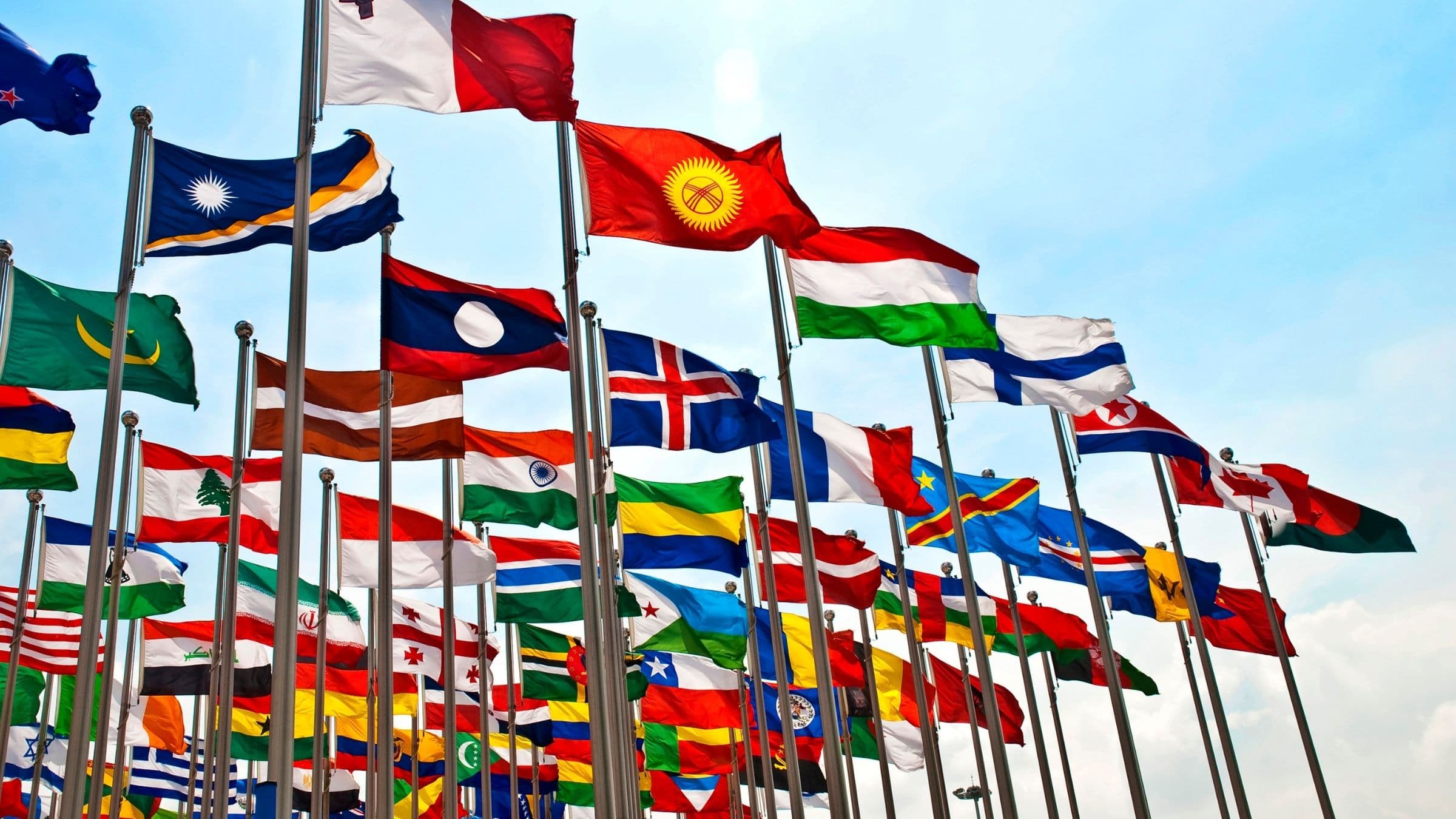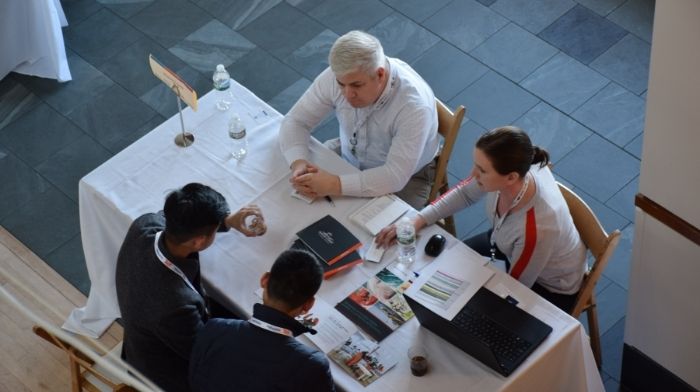
COUNTRY PROFILE
Discover more about the U.A.E. market including overviews about the retail, foodservice, and food processing sectors. Events, resources, and more are linked throughout the profile.

$499.1 Million
total of U.S. processed foods imports in 2023

7% Increase
of U.S. imports in 2023
Focus Economics reports that gross domestic product (GDP) growth likely will be more than halved in 2023 compared to 2022, due to OPEC+ oil production cuts and a post-pandemic normalization of the non-energy sector growth. OPEC+ is a group of 23 oil-exporting countries that convenes regularly to determine the quantity of crude oil to sell on the global market. At its core are the 13 members of OPEC (Organization of the Petroleum Exporting Countries), primarily comprising Middle Eastern and African nations. However, OPEC+ extends beyond these 13 members to include other oil-producing countries.
Available data shows oil output was down 3.7% year on year in 2023, while economic growth in Abu Dhabi and Dubai—two emirates which together account for over two thirds of the UAE’s GDP—slowed notably in January through September compared to 2022. Turning to 2024, activity will be dampened in the first quarter by the UAE’s pledge to cut oil production by roughly 5%. However, this should be partly offset by strong non-energy activity thanks to the government’s diversification drive. Recent steps to promote diversification have included the launch of a nationwide registry for family firms and an AED 208 billion (US$57 billion), decade-long social development plan.
Incomes in the UAE remain among the highest in the region, supported by robust economic development, a favorable business environment, digitalization, and government initiatives aimed at attracting investments and skilled labor. The middle-aged population remains the highest-earning age group due to their more established careers. However, gender gap disparities persist in the country, while income inequality is forecast to increase by 2027.
The standard of living in the United Arab Emirates is one of the highest in the world. A liberal, business-friendly, and market-oriented growth strategy has reshaped the economy. The non-oil sector steadily expanded as diversification of the economy proceeded. However, greater diversification meant that the UAE was hit more severely by the global financial crisis than its neighbors.
The UAE’s population has risen at a shocking pace. In 2023, the total number was 9.9 million (CIA World Factbook Est.), up from just 3 million in 2000. The median age is rising and in 2023 was estimated to be 35.7 years – significantly higher than the regional average. Foreign citizens make up around 88% of the total population and are mainly responsible for the rapid gains in population. However, almost all immigrants are young or middle-aged adults, and their presence ensures a relatively high median age. In addition, immigration has led to an imbalance between the male and female populations – there are two men for every woman in the UAE.
FAS Post Dubai reports that due to the arid climate, approximately 80% of the UAE’s agricultural products are imported. In 2021, the UAE’s total imports of agricultural products reached US$16 billion, a 1.2% increase from 2020. The UAE is the major regional trade hub for the Middle East and North Africa due to a favorable geographic location and modern infrastructure. It is also a member of the Pan-Arab Free Trade Agreement (PAFTA), which has eliminated nearly all tariffs among its signatories, and a founding member of the GCC. Economic friendly regulations, low duties, and extensive free trade zones throughout the country have enabled the UAE to become one of the world’s leading re-export hubs.
In 2022, the UAE is the 2nd largest U.S. export market for processed foods in the Middle East after Saudi Arabia. The UAE imported US$468.5 million of U.S. processed foods in 2022, growth of 11%. In 2023 U.S. exports of processed foods to the UAE grew 7% to US$499.1 million, which now makes them the top market in the region, ahead of Saudi Arabia. Top U.S. exports of processed food products to the UAE in 2023 included:

$6.8 Billion
estimated total of retail sales of packaged food products in 2023

19.5%
increase in retail sales since 2019

$9.4 Billion
estimated in sales of packaged food products by 2028
Euromonitor has estimated 2023 retail sales in the UAE packaged food market to be US$6.8 billion. That represents an increase of 19.5% and US$1.1 billion from 2019. They also forecast sales of packaged food in the UAE market to reach US$9.4 billion by 2028, an increase of US$2.1 billion and 29.1% from 2024. High growth products in the forecast include:
FAS Post Dubai reports that the UAE is a reliable importer of agricultural products due to limited local production. In the past 10 years, the food retail segment has grown rapidly, with the openings of large-scale hypermarkets, supermarkets, convenience stores, online retailers, and home delivery services all catering to an expanding population. The general retail landscape is well established in urban areas with extensive malls and world-leading shopping centers. UAE residents frequently use hypermarkets and supermarkets in malls due to easy access, car parking availability, the variety of products, and of course attractive instore promotions. In 2021, the market witnessed high levels of growth in online food retail; e-commerce sales in the UAE reached US$4.8 billion, a 17.6% increase from 2020.
The UAE retail industry targets customers from four major groups: the local Emirati population and Asian, Arab, and Western expatriates. Retailers must meet the needs of a diverse population with varying income levels by closely monitoring consumer attitudes and trends. Grocery retail industry sales reached US$19.6 billion in 2022, up 5.4% over the previous year. Imports of consumer-oriented agricultural products increased to US$13.2 billion in 2022, an 18.5% increase over 2021 due to the economic recovery spurred by a revival in tourism, government initiatives promoting food security and trade, supply chain stabilization post COVID-19 disruptions, strong hiring, and trade pacts. This is in addition to the UAE’s substantial legal reforms, including modernizing personal and family laws by introducing long-term residency options for high-end real estate investors, as well as prominent investors and artists. These changes aimed to attract affluent individuals, fostering economic recovery and bolstering the luxury retail sector.
The UAE’s retail industry faced significant challenges in 2022 due to global inflationary pressures, rising fuel prices, and supply constraints. Notably, the cost of gas, electricity and other fuels in the UAE increased 2.9% with a surge in inflation from 0.2% to 4.8 % in 2021 and 2022, respectively, driven by increases in housing, transportation, and global food prices. This resulted in an 8.3% hike in food prices for home consumption.
This inflation prompted consumers to prioritize price over quality. In response, the Ministry of Economy introduced an initiative to regulate the pricing of essential household and food items in 70 outlets across the country, covering products like cooking oils, eggs, dairy, rice, sugar, poultry, legumes, bread, and wheat. Although major hypermarkets and several sizable supermarkets willingly adhered to the price regulations for these vital commodities, smaller supermarkets were not included. The perception of relatively high shipping and freight costs for U.S. goods existed prior to these challenges, leading to reduced interest for some U.S. suppliers in serving the market. Nonetheless, the UAE government’s commitment to bolstering food stocks and food security continued to drive demand for retail goods in the region.
Based on reviews from local retailers, some U.S. suppliers are not showing interest in the UAE despite its potential. The UAE government continues to monitor food stocks and place an emphasis on food security, boosting demand for retail goods.
Carrefour: This French brand is the largest hypermarket chain in the UAE. It opened its first hypermarket in Dubai in 1995 and over the years has expanded to over 100 stores split between hypermarkets, supermarkets, and express markets serving more than 300,000 customers a day. Carrefour offers food, non-food, and household goods with year-round deals and promotions. It has a private label called “First 1” and a Carrefour Bio range offering affordable quality organic products. Majid Al Futtaim (MAF) is the exclusive franchisee operating over 320 Carrefour stores in 16 countries across the Middle East, Africa, and Asia. Several stores in the UAE are in MAF shopping malls.
LuLu Hypermarkets: Established in 2000 and overseen by Emke Group, an Indian multinational brand headquartered in Abu Dhabi, LuLu is the second-largest food retail chain in the UAE. It has consolidation offices in the United States. Boasting a network of more than 240 stores, including hypermarkets, supermarkets, lulu express, and an online store, LuLu caters to 240,000 customers daily with an annual retail value exceeding US$3 billion with 5.4% growth in 2022.
Union Cooperative Society: The largest consumer cooperative in the UAE offering a wide range of food, non-food, and household appliances. It operates 23 retail stores and two malls (Al Barsha Mall and Etihad Mall). It was established after a ministerial decree to serve the local community. Union Coop has also launched mini stores under the brand (Coop) and an online store. It offers a loyalty card called “Tamayaz” for both shareholders and non-shareholders and provides discounts through promotional campaigns and special deals. Abu Dhabi Cooperative Society: Established in 1980, the Abu Dhabi Cooperative Society operates three major hypermarkets, supermarkets, and convenience store brands in the country: Abu Dhabi Coop, SPAR, and Megamart. With more than 40 stores in the UAE, it serves 350,000 customersevery week and offers an exclusive range of private labels.
Abu Dhabi Cooperative Society: Founded in 1980, Abu Dhabi Cooperative operates an extensive network of more than 45 hypermarkets, supermarkets, convenience stores, and seven shopping malls throughout the UAE under brands Abu Dhabi Coop, SPAR, and Megamart. With a daily customer base of 50,000, the cooperative offers an exclusive range of private labels.
Sharjah Cooperative Society: Founded in 1977 as the first cooperative in the UAE, it has 37 retail outlets in the emirate of Sharjah. It has its own private label called “Sharjah Coop” and an online store called Sharjah Co-op.
VIVA is the only large discounter in the UAE, offering prices 30% to 45% lower than conventional supermarkets, and most of its barcodes range from between US$2.00 and US$4.00. More than 80% of VIVA’s products are of European origin. Since its market entry in 2018, VIVA has grown tremendously, representing a retail value of US$82 million in 2022, 29% growth since 2021, and the expectation of an 11% increase in 2023. The store currently has 77 outlets in busy residential communities across the UAE’s seven emirates.
Grandiose is another retail chain that has been rapidly expanding in the market. A member of the Ghassan Aboud Group, Grandiose has positioned itself as a one-of-a-kind food avenue concept offering a diverse range of global products. In 2022, Grandiose was awarded the most admired retailer of the year at the Images RetailME Awards for its remarkable expansion and efforts to offer a unique customer experience. With 34 stores and an aim to expand to 50 by 2024 and 60 by 2025, Grandiose’s footprint will continue to grow.
FAS Post Dubai reports ample diversity in food products across all market categories, notable potential for dairy, particularly artisanal cheeses, fresh fruits, animal proteins like beef and chicken meat, is present. Market observation and retailer reviews indicate a growing demand for fresh food, plant-based alternatives for milk and meat, kosher, natural, organic, and “free-from” products. Consumers are increasingly favoring healthier and natural options over processed foods. This change is driven by solid disposable income, consumer awareness, global food trends, and government initiatives to combat obesity. The demand for kosher products rose significantly following the signing of the Abraham Accords.
FAS Post Dubai reports that the UAE is a global hub for tourism, trade, and transportation, with world class hotels and restaurants; tourism alone accounts for 10% to 15% of total economic activity in a given year. New trends such as food markets with the availability of different international cuisines, food trucks, and healthy fast food are becoming more popular in the UAE. In 2021, the hotel, restaurant and institutional (HRI) market was valued at US$12.3 billion, an almost 17% increase from 2020.
According to UAE government statistics there are over 30,000 food outlets in the country, with 60% located in the Emirate of Dubai. The UAE foodservice market is divided by structure into independent restaurants and chained restaurants and by type to full-service restaurants, limited-service restaurants, quick service restaurants (QSR), cafés and bars, as well as street stalls and kiosks. According to Euromonitor, full-service restaurants have the largest share of the total sector sales with a sales value of US$6.7 billion followed by cafes and bars with a sales value of US$2.7 billion.
According to Dubai Municipality, the number of foodservice establishments in the emirate of Dubai reached 18,667 with 9,705 restaurants, 4,310 coffee shops, 2,809 Cafeterias, 840 hotels, 728 catering, and 275 schools. Due to the outbreak of the COVID-19 pandemic in 2020, online foodservice sales have increased dramatically with more than 16% market share in 2021. This segment is expected to continue to grow in the upcoming years. Talabat dominates the food delivery market in the UAE with 74% market share followed by Deliveroo and Careem.
Yum! Brands Inc had the largest share of the UAE foodservice market with 3.3% in 2021. The top 5 companies who accounted for 10.7% of the total foodservice market in the UAE in 2021 are Yum! Brands Inc, McDonald’s Corp, Restaurant Brands International Inc, Starbucks Corp, and Subway’s Doctor’s Associates Inc. The foodservice sector in the UAE depends heavily on imported food products due to low domestic agricultural production. European Union, Brazil, India, and Saudi Arabia are the main competitors in sourcing consumer-oriented products.
FAS Post Dubai reports that U.S. foods with good potential to gain market share in the UAE HRI sector include beef and beef products, seafood products, dairy products, fresh fruit, poultry meat and products, tree nuts, and bakery goods.
FAS Post Dubai reports that the United Arab Emirates’ food processing sector continues to expand, bolstered by strong economic growth and local demand. There are over 568 food and beverage processors and manufacturers in the UAE, most of which are small to medium size. The food processing sector not only feeds UAE demand but is also focused on meeting needs regionally and throughout the world. These firms are almost entirely dependent on imported ingredients due to the UAE’s low production of intermediate, commodity, and lightly processed agricultural products. Significant opportunities exist for U.S. companies to expand their business with this growing sector of the UAE economy.
These factories produce 5.9 million metric tons (MT) of food and beverage products annually, with 2.3 MT in staple food items. This sector relies heavily on imported commodities and ingredients and plays a major role in the government’s efforts to enhance food security and self-sufficiency in basic commodities. In 2022, imports of bulk and intermediate products were US$6.7 billion, 3% ($198 million) of these imports came from the U.S.
Due to the major import supply concerns in 2020, the UAE government enhanced its food security protocols and invested heavily in local food production. The UAE aims to triple food production by 2030; to this end the Abu Dhabi Agriculture and Food Safety Authority have earmarked US$272 million in investments for agricultural projects and the Dubai government has launched the first phase of its major food production hub, the “Food Tech Valley.”
Numerous indoor farms have been launched focusing on production of fresh perishable greens, some using U.S. technology and inputs. The main staple food items processed in the UAE are dairy products, legumes, nuts, cooking oil, dates, poultry, and fish. Other products processed in the UAE include sugar, tea, pepper, eggs, rice, wheat, coffee, baby food, and fresh meat.
Trade sources state that 85% of the processed staple food products are consumed locally, and the remainder is exported. According to the UAE government, 85% of processed staple foods are directed to retail and 15% to foodservice. 10% of non-staple food products are consumed locally while the rest are exported, with 75% directed to retail and 25% to foodservice. The main essential food items processed in the UAE are dairy products, legumes and nuts, cooking oil, dates, poultry, and fish. Other products such as sugar, tea, pepper, eggs, rice, wheat, coffee, baby food, and fresh meat are also processed in the UAE.
The food processing sector in the UAE depends heavily on imported raw materials due to low domestic agricultural production. Russia, Canada, India, and Argentina are the main competitors in sourcing bulk products. As for dairy products, local dairy farms focus on fresh products and face high import competition for processed products. Some local processing firms reconstitute dairy products from milk powder that is mainly imported from Europe and New Zealand.
FAS Dubai reports that U.S. products with good sales potential in the UAE food processing sector include dairy products, fresh fruit, poultry meat and products, tree nuts and bakery goods, cereals, and pasta.
